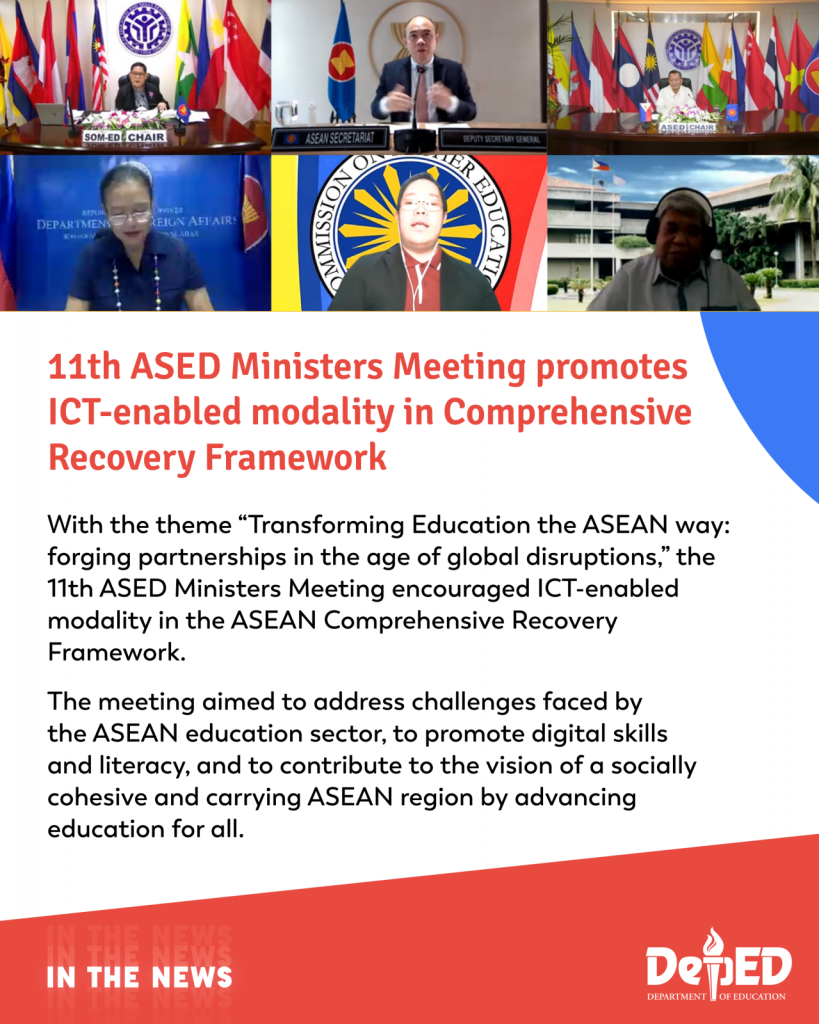 |
December 14, 2020 – In response to the challenges of the COVID-19 pandemic, the Philippines’ hosting of the 11th ASEAN Education (ASED) Ministers Meeting encouraged ICT-enabled modality in the ASEAN Comprehensive Recovery Framework.
With the theme “Transforming Education the ASEAN way: forging partnerships in the age of global disruptions,” the meeting was set to address challenges faced by the ASEAN education sector in coordination with regional efforts to ensure that initiatives will be integrated into the national and regional agendas.
“We would like to transform this crisis as an opportunity to reimagine and transform education. In fact, in the 15th SOM-ED, the senior officials also pledge to strengthen partnerships…they reported some of the responses, lessons learned, and good practices in addressing the effects of COVID-19 in the education sector. It is important to provide the platform and mechanism to share experiences with our neighbors as well as looking on ways on how to move forward,” said Undersecretary Jesus Mateo.
The ASEAN Education Ministers aimed to advance the recovery framework’s initiatives to promote digital skills and literacy, 21st-century skills, and ICT-enabled teaching and learning, to build resilient education systems that can withstand future threats and disruptions.
This was also highlighted during the Conference on Digital Transformation of Education Systems throughout ASEAN held in October 2020, which aims to improve access to digital connectivity and skills and shape the digital transformation of education in the region.
Together with the Education Ministers, Secretary Isidro Lapeña of Technical Education and Skills Development Authority, who chaired the said meeting, also seeks to contribute to the vision of a socially cohesive and carrying ASEAN region by advancing education for all.
The establishment of the ASEAN Technical and Vocational Education and Training (TVET) Council also considers capacity building projects for education personnel and government officials who support regional cooperation programs on TVET.
“We express our commitment and support to the ASEAN particularly in areas of Technical Vocational Education and Training or TVET. These meetings [ASED and SOM-ED] are significant as they give us the venue to present the country’s TVET efforts and programs that are aligned to the strategies for ASEAN Programs and projects in the field of education particularly in advancing TVET in the region,” said Chair Lapeña.
“Given the unprecedented circumstance we are in, the guidance from the ministers and also a coordinated response from all the member states are extremely important. We cannot get out of this crisis alone so we have to work together and we have to do it through collaboration. The ASED and SOM-ED provide the best platforms for us to mobilize regional response, mobilize regional resources,” His Excellency Dato Lim Jock Hoi, Secretary General of the ASEAN Secretariat added.
Moreover, representatives of the Department of Foreign Affairs, Commission on Higher Education, and SEAMEO INNOTECH, also gave support and discussed the importance of these meetings on the current plans, programs, and initiatives of their respective agencies.
These meetings are clear evidence of ASEAN’s untiring commitment to advancing education in the region, especially amidst the largest disruption of our education system in history.
END


